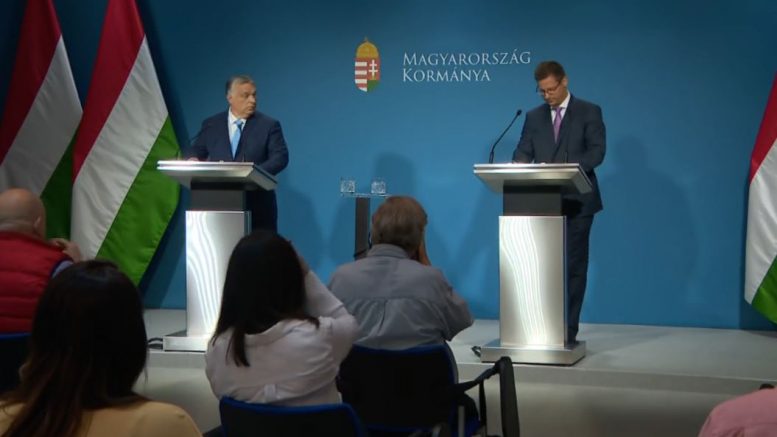Viktor Orbán, Hungary’s Prime Minister, gave a Press Conference on June 10, 2021. I thought that this could give an opportunity to test the allegations about severe limits to press freedom and the suppression of the free press in Hungary – often voiced by the left-leaning media and by different EU institutions.
The idea was the following: if these accusation were true, one would expect that the majority of the journalists would be asking non-controversial, ‘soft-ball’ questions which are easy to answer by the Prime Minister and which can’t be seen as strong criticisms about Orbán and his government. So, let’s see if this was true in this Press Conference.
The conference was long: it lasted more than 2 hours. Journalists from 14 media outlets asked questions. The average number of questions was about 6. The journalist from the TV station RTL asked the most questions, probably more than 15. I tried to decide whether a journalist – and the media he/she represented – was critical or non-critical about the government. This binary categorization is of course very rough, but I think it’s good enough in this case. So, here is the list of these press organs, and my evaluation of their stand related to Orbán and his government. I also included examples of the questions asked by the ‘critical’ journalists. None of these – or similarly critical or uncomfortable – questions were asked by the ‘non-critical’ journalists.
- MTV1 – non-critical
- RTL – critical (why has Orbán’s family become rich)
- Magyar Nemzet – non-critical
- Hír TV – non-critical
- ATV – critical (the timing of the planned pay-back of income tax – is it a populist measure to help Fidesz, Orbán’s party, win the 2022 elections?; critical questions about the planned Fudan University campus in Budapest)
- index.hu – non-critical
- mfor – critical (questions about the high Covid death rate in Hungary; will Orbán himself get a re-payment of the income tax planned for beginning of next year?)
- Heti TV – non-critical
- telex.hu – critical (Government doesn’t share enough information about planned Fudan University campus; Covid death rate of vaccinated people in Hungary higher than in USA; ‘kneeling down’ incident during a soccer match)
- 24.hu – critical (will Fidesz support the candidature of Mr. Simonka who is now under criminal investigation?; what about the large amounts of money earned by Orbán’s family?)
- 444.hu – critical (why the high Covid death rate and what role does the government play in it?; criticizing the Hungarian Foreign Minister for accepting a yacht-trip by a business man)
- HVG – critical (questions about China; methodology of creating vaccines in planned Hungarian vaccine factory is outdated)
- Magyar Hírlap – non-critical
- Azonnali – critical (Orbán’s role in the scandal of floating ideas about re-drawing the borders in the Balkans; questions about the bad behavior of some Fidesz members in the Hungarian Parliament).
As shown by the above list, the majority of the journalists and their press organs – 8 out of 14 – were ‘critical’ towards Orbán and his government, asking many uncomfortable or strongly critical questions. 6 of the 14 were ‘non-critical’.
We would expect exactly the opposite pattern if the allegations about the threat to press freedom and the suppression of the free press in Hungary were true.
Thus, this test didn’t provide any evidence for these continuously repeated allegations. On the contrary, it provided evidence for the existence of a media landscape in Hungary in which the majority of the media outlets are willing – and able – to ask critical questions of Viktor Orbán and his government.
Update in December 2023: Orbán had another press conference on 21 December 2023. I have not analyzed this conference in the way I did the one on 21 June 2021. However, after listening to it, my impression was that the press asked even more critical questions than in June 2021. Hungarian freedom of press does not seem to be more in danger than it was in 2021.

Be the first to comment on "A Test of the Freedom of Press in Hungary"